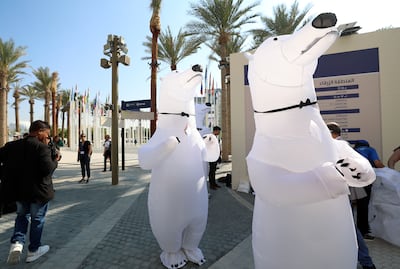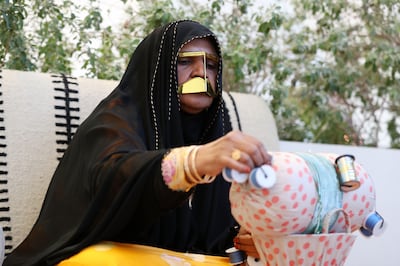As we convened in Abu Dhabi for the Cultural Summit 2024, under the banner of “A Matter of Time”, I was reminded of the critical juncture at which we stand – a moment that will undoubtedly find its place in history.
This gathering in my home city, a nexus of culture and innovation, underscored the urgency of our mission to confront the dual crises that threaten our planet: climate change and the loss of nature and biodiversity.
In my roles as president of the International Union for Conservation of Nature and the UN Climate Change High-Level Champion for Cop28, I have come to appreciate the intricate dance between time and the environmental challenges we face.
Our understanding of time – whether the ticking clock of our daily lives or the expansive geological eras – shapes our response to these crises. The disconnect between the frenzied pace of human activity and the slower rhythms of the natural world has led to unsustainable consumption patterns, pushing us beyond Earth's limits.
Earth Overshoot Day, which last year fell on August 2, highlights the gravity of our situation. This date marks the time when humanity's demand on nature surpasses what our planet can regenerate in a year, illustrating our over-consumption as if we lived on 1.75 Earths. The consequences of our actions are not abstract future predictions but present realities.

The impacts of climate change and biodiversity loss are felt here and now, with rising temperatures, erratic weather and faltering ecosystems that present immediate threats to human and non-human life alike. It also affects our ways of life, including cultural heritage and practices.

The concept of “tipping points” – moments of irreversible environmental damage – are a stark warning. Yet amid this urgency lies an unprecedented opportunity for transformation. By rethinking our relationship with time, we can align our actions with the natural cycles that have sustained life for aeons, balancing immediate human needs with the long-term health of our planet.
Our path forward is clear but challenging. It calls for a sharp increase in renewable energy, heightened energy efficiency, a responsible shift away from fossil fuels and a renewed commitment to preserving nature.
The decisions and pathways laid out in the landmark UAE Consensus agreement from Cop28 are a testament to what can be achieved when nations and non-state actors come together. However, the financial hurdles are significant. Despite mobilising more than $2.7 billion for nature at Cop28, we face a nearly $1 trillion annual funding gap to adequately protect our planet. This calls for not just public and institutional funding, we must also mobilise private finances to bridge this gap.
The solutions to these challenges require a shift in governance to embrace long-term goals, ensuring that our actions today do not compromise the well-being of future generations. This includes mass forest restoration, adopting regenerative agricultural practices and protecting the oceans, among many others. Such initiatives, supported by commitments made at Cop28, highlight the indispensable role of ecosystems in our survival and well-being.
Our collective endeavour must also involve redefining what we consider to be progress. True progress is not measured by consumption or economic growth alone but by the sustained health of our societies and the natural world.
The challenges we face are not the responsibility of any single country or sector but a global imperative. Achieving a sustainable future requires collaboration across all of society, including governments, businesses, scientists, indigenous communities and cultural institutions. It is through this collective effort that we can hope to forge a legacy of resilience and stewardship for our planet.
As we reflect on the role of cultural institutions in this global effort, it becomes clear that they possess a unique power to inspire change. By fostering a deep connection with people and communities, cultural institutions can bridge the gap between traditional knowledge and action, transforming the way we understand and respond to the environmental crisis.
Through exhibitions, education and community engagement, they can turn scientific data into compelling narratives that resonate with a broad audience, sparking a collective movement towards sustainability. Further, Abu Dhabi's museums and cultural institutions can help play this role by showcasing the region's rich heritage and promoting cross-cultural dialogue on environmental issues.
In this critical moment, we are called to choose the legacy we will leave behind. Will we be remembered as the generation that stood by as our planet suffered, or as the pioneers who rose to meet the greatest challenge of our time? The decision is ours, and the time to act is now.






